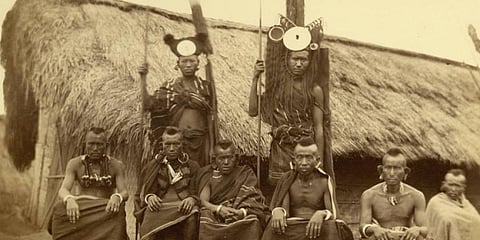

KOHIMA: The process to repatriate the human remains of Nagas from a museum in the United Kingdom is underway, with a collective at the helm of the initiative.
The Pitt Rivers Museum (PRM) in Oxford, which houses 213 human remains of Nagas among other artefacts from across the globe, had in 2020 announced it would remove the human remains and other "insensitive exhibits" from the display.
Coming to know of it, an Australia-based Naga anthropologist, Dolly Konyak, roped in a fellow Naga social scientist, Dr Arkotong Longkumer, who is based in Edinburgh in Scotland, and approached PRM director Laura Van Broekhoven, who in turn urged Forum for Naga Reconciliation (FNR) to be the facilitator in the repatriation process.
FNR has been playing an active role in reconciliation among various Naga factions that have been holding peace talks with the Centre. These human remains were taken from Nagaland and other Naga-inhabited areas in the region by the British more than a century ago for an exhibition of the colonised people and the repatriation is part of the "decolonisation" process.
FNR convenor Wati Aier said the organisation is working as a facilitator in the process, which is in the initial stage.
Ellen Konyak Jamir, a member of FNR, said the forum, along with Dolly Kikon and Arkatong Longkumer and some other members of the Naga society, formed a Recover, Restore and Decolonise (RRaD) team in 2020 for the repatriation process.
"We have learnt that the human remains were taken under duress and not given due ritual of burial or treated with dignity. They were taken for infotainment or research purposes which are against our values and belief," Jamir told PTI.
"The actual repatriation process has not yet begun but the process has been initiated and it may take some time as it is an international issue. We have a lot of work to do," she said.
Jamir said the RRaD team has conducted interviews with scholars, elders and tribal organisations and generated awareness on the issue.
She said that mixed reactions were received during their interaction with the Naga people.
"Youths attended morung lectures in Kohima and Dimapur in large numbers. They were very curious. But some elderly people felt that the remains must not be brought back as those will bring back bad memories and the pain associated with it but most of the people wanted the remains to be repatriated," she said.
Jamir said more consciousness needs to be created on the issue.
She said Arkatong Longkumer and Meren Imchen have brought out a graphic novel on the remains titled 'A Path Home' to engage with the people.
"We feel it is an important work...the repatriation of our ancestors' remains is an important initiative and Naga people must be made aware of the issue," Jamir said.
The museum also houses around 6,000 Naga artefacts but the forum is working on the repatriation of only the human remains, which include parts of skulls, fingers and limbs.
Asked if the remains have been individually identified or if the descendants are known, she said the museum has some names of regions and tribes they belong to but a lot of work remains to be done with the help of anthropologists and researchers. "It is going to be a huge task and will involve a lot of research work," she said.
Asked whether any specific time frame has been given by the museum, Jamir replied negatively but said that the museum is "very serious" about repatriation.
Broekhoven had herself visited Nagaland during the Hornbill festival last year to learn more about Naga culture and engage with various tribes, she added.